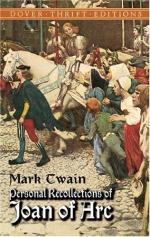“But think—we poor beleaguered citizens who have hardly known the flavor of fish for these many months, have spoil of that sort again, and we owe it to you. There’s a noble shad for breakfast; wait—be persuaded.”
Joan said:
“Oh, there’s going to be fish in plenty; when this day’s work is done the whole river-front will be yours to do as you please with.”
“Ah, your Excellency will do well, that I know; but we don’t require quite that much, even of you; you shall have a month for it in place of a day. Now be beguiled—wait and eat. There’s a saying that he that would cross a river twice in the same day in a boat, will do well to eat fish for luck, lest he have an accident.”
“That doesn’t fit my case, for to-day I cross but once in a boat.”
“Oh, don’t say that. Aren’t you coming back to us?”
“Yes, but not in a boat.”
“How, then?”
“By the bridge.”
“Listen to that—by the bridge! Now stop this jesting, dear General, and do as I would have done you. It’s a noble fish.”
“Be good then, and save me some for supper; and I will bring one of those Englishmen with me and he shall have his share.”
“Ah, well, have your way if you must. But he that fasts must attempt but little and stop early. When shall you be back?”
“When we’ve raised the siege of Orleans. Forward!”
We were off. The streets were full of citizens and of groups and squads of soldiers, but the spectacle was melancholy. There was not a smile anywhere, but only universal gloom. It was as if some vast calamity had smitten all hope and cheer dead. We were not used to this, and were astonished. But when they saw the Maid, there was an immediate stir, and the eager question flew from mouth to mouth.
“Where is she going? Whither is she bound?”
Joan heard it, and called out:
“Whither would ye suppose? I am going to take the Tourelles.”
It would not be possible for any to describe how those few words turned that mourning into joy—into exaltation—into frenzy; and how a storm of huzzas burst out and swept down the streets in every direction and woke those corpse-like multitudes to vivid life and action and turmoil in a moment. The soldiers broke from the crowd and came flocking to our standard, and many of the citizens ran and got pikes and halberds and joined us. As we moved on, our numbers increased steadily, and the hurrahing continued—yes, we moved through a solid cloud of noise, as you may say, and all the windows on both sides contributed to it, for they were filled with excited people.
You see, the council had closed the Burgundy gate and placed a strong force there, under that stout soldier Raoul de Gaucourt, Bailly of Orleans, with orders to prevent Joan from getting out and resuming the attack on the Tourelles, and this shameful thing had plunged the city into sorrow and despair. But that feeling was gone now. They believed the Maid was a match for the council, and they were right.




